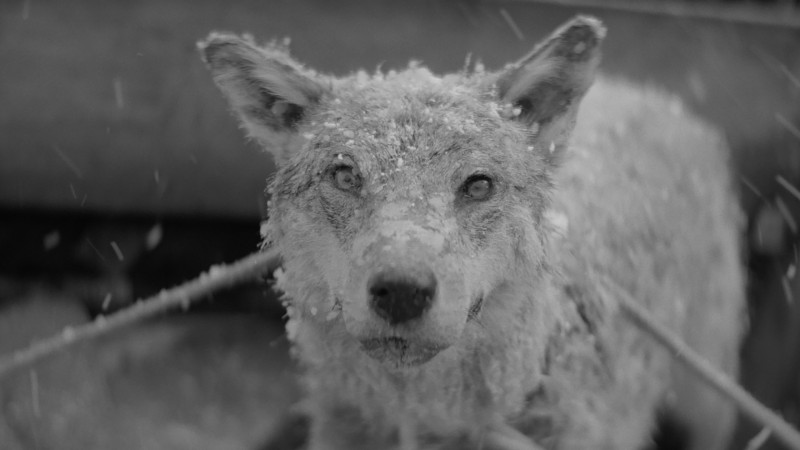




There is barely a storyline in this elegant Bulgarian drama. Some might be tempted to describe it as a non-narrative film. What is certain is that the plot is subordinate to the haunting images and the sounds. Two middle-aged men (Samuel Finzi and Iossif Surchadzhiev) spend their days inside a precarious countryside house. Their interaction is mostly laconic, except when one of them does crosswords: “what’s the largest fresh water lake in the world”, “Spanish dish with the letter ‘l’ “, and so on. Their scarce communication is hardly coherent. A very perky crow inside a cage is the most talkative movie character. The landscape is almost entirely covered in snow. Drinking rakia (fruit brandy from the Balkans) is their only comfort, a habit strangely shared by their feathered friend.
A third character called Petar Motorov has gone into town with his rifle and sleigh. He is nowhere to be seen, in a film virtually entirely set within the shabby house and its snowy surroundings. Two stranded strangers demand help fixing their broken plough, while a menacing priest asks for the whereabouts of the elusive Petar. Petar’s horse eventually returns, but instead of bringing his owner back home, he carries a stuffed wolf flanked by two sticks, one on each side. The taxidermic character inexplicably multiplies itself, in a movie where animals – living and dead – are as important as the human beings in it. Their precise significance is as mooted as pretty much anything in this 110-minute experience. Bulgarians tenetz (ghosts) and kukeri (elaborately dressed men, with horned masks intended to scare evil spirits away) provide a touch of mysticism. Visually impressive. More sensory than spiritual.

The sharp black-and-white cinematography creates a sense of isolation. Almost everything is covered in snow, yet such whiteness/vastness offers our hapless characters little comfort and respite. Instead it imprisons humans and animals alike. It could even kill them. This wintry atmosphere is achieved mostly through CGI, as it failed to snow while the crew were filming. An impressive outcome: such manipulation is barely visible even to the most attentive eye. A lot of attention is also devoted to the elaborate music score, which blends seamlessly with the sounds of man and nature: the conversations, the wind blowing fiercely, the chatty bird, and so on.
Andrey Paounov seems to take inspiration (or perhaps even pay tribute) to at least two classics. An axe-wielding character breaks through a door while creepy children appear at the end of the corridor, immediately evoking The Shining (Stanley Kubrick. 1980). A sudden ascension into a dreamy, colourful zone might bring Tarkovsky’s Stalker (1979) to mind. Yet January is a beast of its own. A movie to be enjoyed in the darkness of the titular month.
January is out in selected cinemas across the UK on Friday, January 27th. It premiered in 2021 at the Rebel with a Cause section of the Tallinn Black Nights International Film Festival.











